In Rank Your Records, we talk to artists who have amassed substantial discographies over the years and ask them to rate their releases in order of personal preference.
Stars co-frontperson Torquil Campbell is not the type to hold back an opinion, especially those of the controversial variety. In a rather meek Canadian music industry, he has stood out like a sore thumb for his outspokenness during interviews and on social media. He declares himself a “very fucking annoying human being,” however, his refusal to keep chit-chat unfiltered makes him one of music’s great talkers, and an obvious candidate to rank his band’s records.
Videos by VICE
Although he was ruthless with his ranking, Campbell assessed his band’s music from an emotional angle, he says. “The way I came up with this list is, I mean, I don’t listen to any of these records, but if I were to listen, it would be which of these records would mean the most to me as a listener and make me feel the most emotions.”
In 2019, Stars will reach the 20-year mark. Formed in New York City by Campbell and his friend Chris Seligman but based in Montreal, the long-running indie pop act was a major contributor to its hometown’s remarkable cultural boom in the early 00s. Alongside the Dears, Arcade Fire, and Wolf Parade, Stars helped take the independent music scene in Canada global (multiple members of Stars also put in time playing with Broken Social Scene). Unlike quite a few of their peers, though, Stars have managed to sustain a career for themselves, despite facing the same problems as every 20-year-old touring band.
When it comes to commemorating their longevity, Campbell says Stars don’t exactly have plans to celebrate. “[We’re going to] try and survive?” he says with a hint of concern. “Yep, that’s probably how we’re gonna do it. Our big party will be to try and continue to exist, because it ain’t fucking easy anymore, my friend. But there are a half a million people out there who really fucking love us, so if we can continue to have a relationship with them and continue to make good work, I trust that it will still be possible.”
For now, Stars are looking to close out 2018 on a high with a quick three-week North American tour in support of a brand new single, “Are You With Me?” produced by cohort Kevin Drew of Broken Social Scene.
“That song happened three weeks ago,” he explains. “That was Kevy. I hung out with him in Vancouver and he said, ‘Let’s just do a song.’ And we’ve always talked that way for years. But then we just took a leap and did it and it was so beautiful. It was so fun. We did it in a day and a half, with Murray [Lightburn, The Dears] engineering some of it. Kev is just such an incredible artist and incredible person. I just can’t say enough about what a beautiful soul he is.”
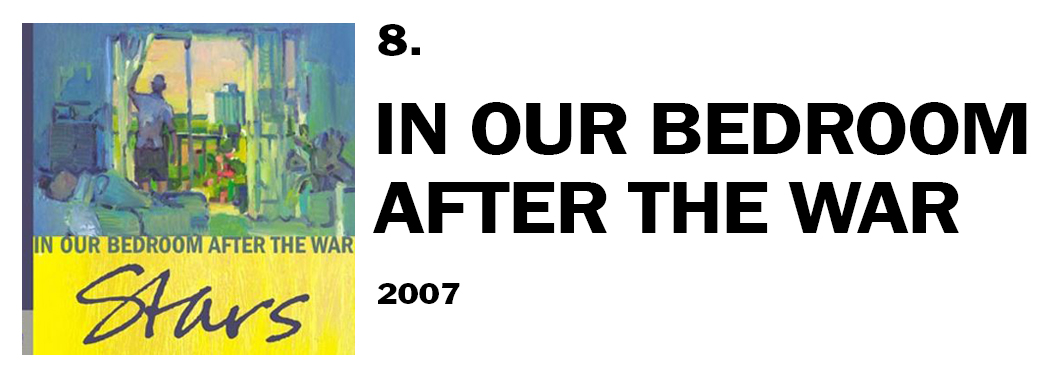
Noisey: Why is this one your least favorite?
Torquil Campbell: Because it’s a bit of a bloated mess. It was the first and only time that we were given a lot of money. We were given a quarter of a million bucks, I think we spent on that record, because Set Yourself had gone gold and I think they thought that was just how things were gonna go for us. We didn’t really know how to spend the money, you know, and we had tried really hard to get this producer who had worked with Phoenix, Daft Punk, and a bunch of artists that we liked, but he pulled out at the last minute, which so often happens with those dudes. So he said, “Oh, I’ll send you my engineer who works on those records with me. He’s really great too!” And he did know what he was doing as an engineer, but as a producer he had no fucking clue how to do it. So we were this crew of people who didn’t really know how to produce a record, in the A room of the Warehouse in Vancouver, spending about $2,200 a day, trying to make a record that sounded like Steely Dan and Fleetwood Mac. We wanted to make an LA record and we didn’t know what the fuck we were doing.
And we were all pretty drunk a lot of the time, and me and Amy [Millan] were fighting constantly because there was all of this ego bullshit going on between us. It was just a mess. There are great songs on it but it’s too long and, sonically, there are a lot of missed opportunities and self-indulgence, in my opinion. If we had cut it by four tracks and were more disciplined about some things, it maybe could have been the best record. We just swung and missed on that one. I know it’s a controversial opinion from the fans’ point of view, because I know a lot of fans like In Our Bedroom After the War.
Yes, and let’s not forget it was shortlisted for the Polaris Prize—
Well, then it must have been good! Because we all know that is the only measurement by which we can truly judge art: fucking shortlisting Polaris Prizes!
Well, if that’s how you feel, did it make getting behind that accolade harder because you had those reservations about the album?
Here’s the thing about prizes and awards: if you care when they give them to you, then you have to care when they don’t, so we’ve tried not to care under any circumstance. Because it’s such a fucking trap to fall into. We’re not a particularly secure group of people in the first place. We’re all pretty ready to say when we suck. When people approve of you it makes you feel good, but when they don’t approve of you it makes you feel bad. I don’t even remember it being shortlisted for the Polaris Prize. I think at the time that we were certain, as we always were, that we wouldn’t win. We never win anything, and now we don’t even get nominated for things. We are a band that has been—even if I say so myself—criminally ignored by the industry, at large. And that just continues to be more and more true. But despite that we have continued a very loving relationship with people who like the records. We wanted to be a cult band and unfortunately, we are! [Laughs]
Interesting. I feel like I should bring up how Pitchfork gave this album a 7.4 score, which isn’t too shabby, and yet you went off on the writer, composing a rant on MySpace in which you called him an “undergraduate geek living in a state of self-imposed virginity.” Did you ever regret being so harsh on him?
Ryan Dombal! Did I regret being harsh on him? No, because he was harsh on me. I took umbrage to the amount of time he devoted to insulting me personally in that review. I am a very fucking annoying human being. Some people in the rock game are uncomfortable with my messy, emotional, and confrontational style. And that’s fine, so be it. I grew up in the theatre and all of my family are actors. All my life I’ve watched people deal with critics. Sometimes they’ve been praised by them but more often they’ve been criticized by them. When you live in a family where your wages depend on what some guy thinks of your record, the rage begins to build. My problem with Pitchfork and modern criticism in general has always been the scoring. In order to sell papers or get clicks, people come up with these moronic scoring systems. It has cheated the reader, it has cheated the writer and it has definitely cheated the artist.
I think it’s lazy, reductive, and I don’t know a single writer or a single artist who likes it. The only people I’ve heard defend it are editors who feel it is another way of cramming more information into a smaller space. I guess at the time it felt like Pitchfork was trying to damn us with faint praise and control our career in a way that pissed me off. In retrospect, you only give it power by responding to it, and it was a waste of time to do that. And it really fucking harmed us. Pitchfork has never really been kind to us after that. It was dumb, but it joins the pile of dumb shit I’ve done and will continue to do in my life. [Laughs] I don’t regret being mean to Ryan Dombal. I just regret letting Ryan Dombal have that power over my feelings.
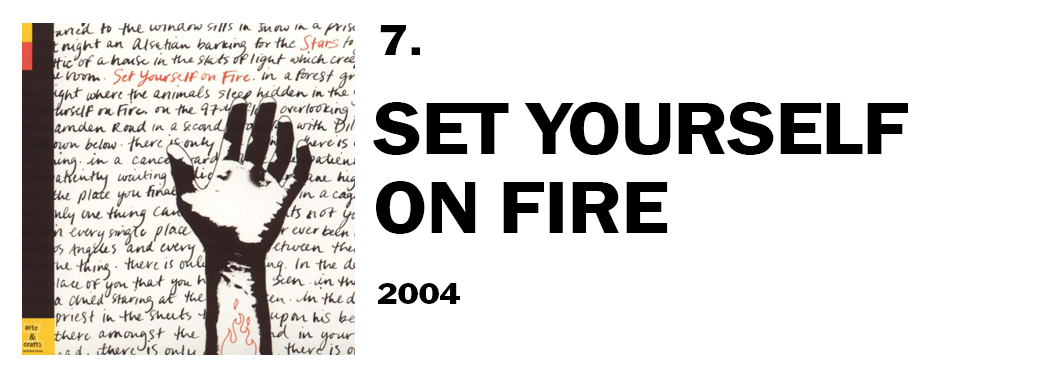
I’m surprised by this because it’s easily the most popular Stars record.
Yes. This is a really controversial one! For sure, it’s the most popular record of ours. Absolutely. But I think it’s overrated. Having said that though, I think all of our records are great. I love our records! [Laughs] None of them are bad records. Set Yourself On Fire has some really cool songs on it, but I think the reason why it was our most successful record had more to do with timing than it did the quality of it. I feel that the record that came before it, Heart, is the most beautiful record we’ve ever made, as well as the most thematically and structurally perfect record we’ve ever made. But it wasn’t quite time yet. Broken Social Scene, Metric, and Arcade Fire each hadn’t put out their records yet. I remember sitting in a van with [Arts & Crafts co-founder] Jeffrey Remedios and playing Set Yourself for him before a gig, and he said to me, “This is a really special record. This is gonna be big.” But I always felt it was a bit small-sounding, like we didn’t really fulfill the dynamic potential. I think that Stars have always struggled to be as good on record as we are live. And to be as muscular as we are live. Like, we’re a rock band, fundamentally, and I don’t think Set Yourself On Fire quite conveyed that enough for my taste. And if I’m being honest with you I resent it a little bit. I resent that record because it’s the benchmark. After that, everyone would say to us, “When are you gonna make another Set Yourself On Fire?” Everything we’ve ever done since has been compared to it. It’s that child in the family who does everything right and everyone says to the others, “Why aren’t you as good as him?” I guess I feel defensive of the other records, in light of how much people praise Set Yourself On Fire. For me, everybody else loves it so much so I don’t have to.
The two albums before this were quite intimate, and I feel like this is the one where you broke out of that zone.
Well, it’s where we became a rock band. Our drummer Patty [McGee] didn’t play on Heart. George Donoso played what drums there were on that album; most of it was just programming. This was the first time we’d ever recorded the guitar, drums and bass in a studio. We’d never really been in a studio before that. And I have great memories of this record because of [engineer] Tom McFall, who I really love. He really made that record the success that it was, because Tom pushed us to be more aggressive and take bigger sonic risks, to make ugly noises, not just pretty noises. I think that’s where Stars found our ability to combine cacophony and dissonance with heavy, heavy melody. It toughened up our sound and was a big leap for us.
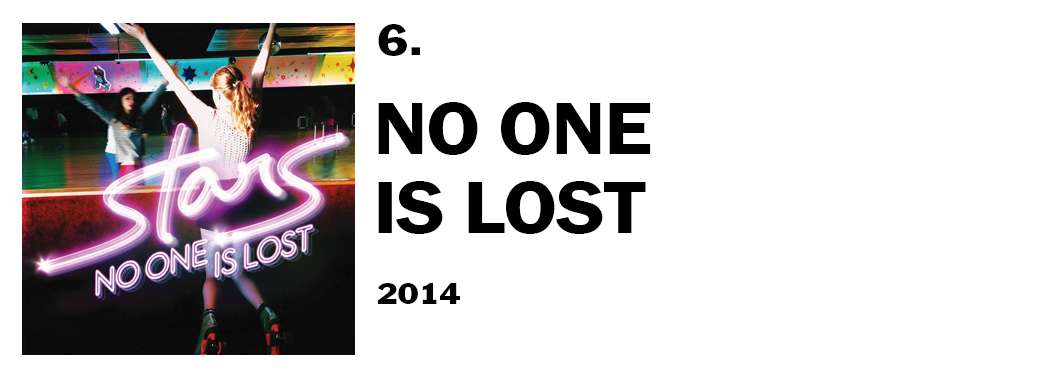
I feel like maybe it deserved to be higher, and that’s sort of what happened to the record in general. [Laughs] I thought it was a very joyful record with some of our best pop songs on it. And it was made in sheer hope against despair. Eoin [O’Leary], our manager at the time, a dear person to us, was 28 at the time and went to the hospital with a stomach ache one day, and later called us saying, “I have a tumor the size of an apple in my colon, and they’ve given me six months to live, basically.” And that was a really fucking mind-blower. And it happened right as we were about to make the record. For a minute we thought about stopping to help Eoin get through it. He didn’t want us to do that, but we were so shaken and scared by the whole thing that we decided to stay in our studio, Mount Zoomer, and make something that was a shared, joyful, family experience.
The studio is a shitty apartment above a gay disco in Mile End, but it’s got great vibes. A lot of beautiful music has been made in there. Arcade Fire found it and made Funeral there, and Wolf Parade made At Mount Zoomer there, and right now Operators are recording there. But below there was this gay disco and we’d drink down there every night, and we became good friends with the people that worked there. So the whole time we would hear this [simulates banging noises], and we decided to make songs with heavy kick drums so we couldn’t hear the noises anymore. We basically recorded to the kick drums coming from underneath us. I like that record, but maybe it was slightly unedited. There is always the issue that someone likes a song and someone doesn’t like a song, but at the end of the day you decide to put it on anyway. And then if we can’t decide which songs to take off, then fuck it, we just put all of the songs on. That is one of the disadvantages of being in a true democracy, which this band is: sometimes a consensus has to be reached and it’s not a pure, artistic vision, but it is a vision that keeps us together—and that’s enough.
The song “Look Away” is about a couple that originated in “Elevator Love Letter” on Heart and then appeared throughout the years in “Your Ex-lover is Dead,” “Midnight Coward,” and “Walls.” What made you continue to bring those characters back?
I guess we fell in love with them in a way. I think they provided a world in which Amy and I could be on stage together and be romantic. Because Evan [Cranley] and Amy are a couple, and I have a wife, but Amy and I adore one another as platonic friends, but we needed to perform on stage as lovers. I think inventing those two creatures who are sort of us but sort of not us gave us the breathing room, the distance from the actual relationship. It allowed us to take more of an emotional risk together than we might have if we didn’t have those characters to rely on. Those characters are people that live desperate lives; more desperate than lives me and Amy have ever lived. They’re not us, but they contain a lot of aspects of our character. I think you can also read all of those songs as a conversation between two artists who sing together and love one another and write for each other and share the stage and do all of the things that we do together. Stars is a love affair between six people. It’s a sexless marriage! But we’re very in love and we’re married. So those characters just gave us a cloak to wear so it didn’t get too real.
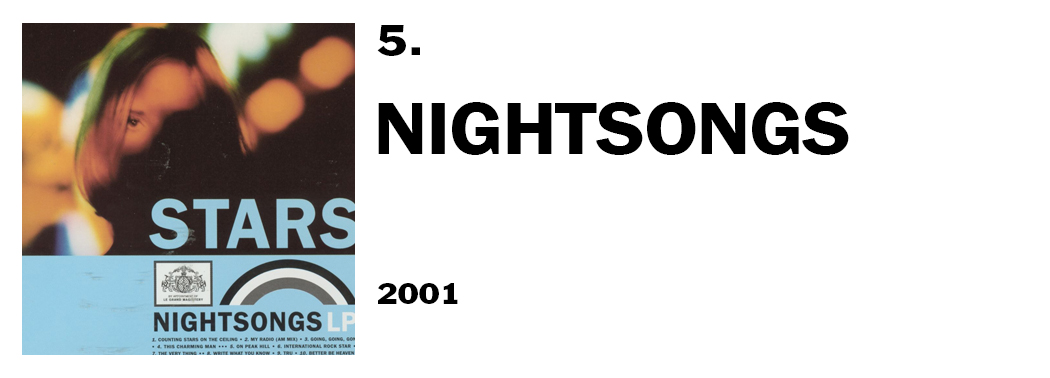
Now we get into the area where everything is kind of a tie. Like, I love Nightsongs so fucking much. It’s the sound of my dream coming true, my life-long plot taking form. It came after ten years of hanging out with Jimmy Shaw [Metric], Chris Dumont [Campbell’s other band, Memphis], Chris Seligman [Stars], and Emily Haines [Metric], and being really bad at writing songs. Me and Jimmy wrote 200 pretty bad songs over seven years in New York. Then he found Emily and he left me, and I was devastated and didn’t know what to do. Seligman was also devastated and didn’t know what to do, so we moved in together and lived in a studio apartment for a year and a half.
At the time, I was still an actor, doing this play called Shopping and Fucking with Philip Seymour Hoffman for seven months. Every night after the play he would mock me for going home and writing these shitty pop songs. He would say, “Why are you doing that, dude? It’s so fucking embarrassing. You sound like the Pet Shop Boys. You have to stop.” So then everything was made at night. Chris would sit there all day and figure out how to use this prototype computer. This was like 1997. And we were completely penniless and completely hopeless. And our wildest fucking dream was to go into Other Music and see our fucking album on the shelf. That was the end game. Beyond that, there was zero plan. I remember feeling like, “If that ever happens I will never complain about anything ever again.” It was just an amazing moment of all those teenage hours, days, months, years in my bedroom in the 80s coming true. Making this album with my best friend since the age of eight just changed my life. It was the beginning of my life.
According to one interview, you said this album sold a total of 78 copies.
I think it did when it came out. And now the vinyl is on Discogs for like 375 bucks. We’re unable to reissue it, though. The first record deal we signed was for $1,500 for three albums for the world. [Laughs] At the time, $1,500 was two months’ rent, so we were like, “This is fucking incredible!” We were such fucking morons. I remember Chris Taylor [founder of Last Gang Records] at the time came and slept on our couch, and looked at the contract and said, “Don’t sign this!” But we completely ignored him. So it sold 78 copies but then Nic Harcourt at KCRW found it and everything started to happen. When KCRW played it, shit began to rapidly change. Our cover of “This Charming Man” started to connect with people. It was a very gradual thing. By the time somebody else wanted to sign us, we had to give him Nightsongs in perpetuity because he wanted like $100,000 to get out of the contract. The guy who released it kept the rights to the album. We’re not even able to re-record those songs, unless it’s live. And now Nightsongs has sold something in the region of 60,000 copies and we’ve never seen a penny.
I read that you, Amy, and Evan were arrested for smoking weed in the park?
Yep! We spent two days in jail in New York City in 2000. Just before Nightsongs had come out. We were on tour with Trashcan Sinatras, a band I fucking loved so much. It was all of my dreams coming true at the same time. But we were just walking around Central Park in the afternoon smoking a joint, which we threw on the ground. Then this kid came up behind us and pulled out this badge. It was Giuliani time, when they’d throw people in jail for jumping turnstiles and pissing in alleyways. So we were in jail for two days and then they dismissed the charges. When we got out we literally jumped into a cab and drove straight to the gig at Maxwell’s in New Jersey. We got there 20 minutes before it started. When we got up on stage we were able to give the immortal lines, “Ladies and gentlemen, we just got out of jail!” But then we should have just kicked into a full-on rock song, but at the time we used this box we called Stevie for all of our beats. So it was like, “Ladies and gentlemen, we just got out of jail!” and then [simulates weak-sounding programmed beats]. “Here’s some really fey pop songs for you!” It didn’t really fit the profile. Stars have always partied like we’re in Guns N’ Roses, even though our music sounds like we work at a florist.
Amy appears on the album, but she wasn’t a member yet.
We had used several vocalists on Nightsongs. A girl named Renée [Cologne] sang on “My Radio,” there was Kendall Mascott who was on Le Grand Magistery, and of course, Emily, but we had not yet met Amy. And then Emily and James left to do their own thing. Emily and I had discussed working together, but it only took 20 minutes at dinner for us to quickly realize that we aren’t meant to be in a band together. But we needed someone to sing in our touring band, and Evan had joined already, and he told us that Amy was really cool and talented, plus she was Emily’s friend. Amy had come back from Los Angeles and it was just good timing. We stuck that last song, “Toxic Holiday,” on the record because we wanted Amy to have input. She had become a member after the record had been finished. It all sort of happened at once. But Heart was the first real record that Amy participated in.

We made it in Studio Victor, in the old RCA building in Montreal. Emile Berliner, who began RCA and invented the phonograph, one of his first factories was in Montreal. It’s a fucking incredible building. It used to be an all-in-one building where they manufactured records on one floor and had a recording studio on the next floor. Duke Ellington recorded in this gorgeous studio, and for a while in the 70s and 80s they had five engineers working in 24-hour shifts, seven days a week. Roch Voisine and Céline Dion, all of the big Quebec stars, made records in there. But it’s gone now. They fucking destroyed the place, which is really a crime against music. But it was an amazing place to work. We did it with Graham Lessard and Marcus Paquin, and they were fantastic. We just had a great, constructive time with these two enthusiastic people. This is when Chris McCarron joined the band. Up until then, Evan had always played guitars and basses, so before that we never really had the ability to write with the guitar playing in the room. Suddenly we found this guy. And he had only joined as a touring guitarist. He was such an amazing songwriter too. So we were like, “Fuck, man, I think we have to let this guy be in the band! He’s so fucking good!” So The North was the first time we had his gifts with us in the studio. He is the reason that Stars are still around. Without Chris, I think we would have called it. He just opens so many doors for us.
You got a lot of publicity for responding to then Canadian Prime Minister Stephen Harper’s director of communications, who tweeted his love for this record. I believe you called him “a bottom feeding, cynical footman for the most repellant figure in Canadian history.” Is it safe to say that you care about who listens to your music?
[Laughs] I think I do care about who listens to Stars. I think I do care about the fact that there are bad people in the world. It bothers me. And I don’t want to be involved with them. I particularly didn’t want some fucking stuff, pickled fascist to up his social media profile and make himself look cool by praising my record. Our memories fade fast, but at the time those motherfuckers were evil! They were fucking evil! And I didn’t want some smug prick attaching himself to our music and try to normalize himself with it. There is nothing normal about those people and I won’t be used for cover.
I am a street dog. So if bullies want to fight with me, I will fucking fight with them. I don’t give a shit. And that’s not true of everybody in the band. There have been many times when I have pissed my friends off and done things that they have had to stand behind that they didn’t believe in. I feel bad about that. It’s a big regret of mine. I’ve taken steps to be more careful. Because this is as much Evan’s, Chris’s, or Pat’s band as it is mine. And Amy and I have a tendency to say what we mean and mean what we say, and for the boys that can be tough, because they’re more circumspect, considered people who don’t necessarily agree with everything we’re saying. I mean, my wife didn’t talk to me for three days after I said Stephen Harper got exactly what he wanted when that guy shot those people on Parliament Hill. But I don’t regret saying that because it’s 100 percent true! That is exactly what Stephen Harper wanted to have happen. He was very glad that that man murdered that poor, young person. Because he’s a troll. He’s a disgusting sloth from hell. And you can print that! He can burn for fucking eternity. I hope he gets hit by a car! Quote, unquote! I just got myself in trouble again. [Laughs]
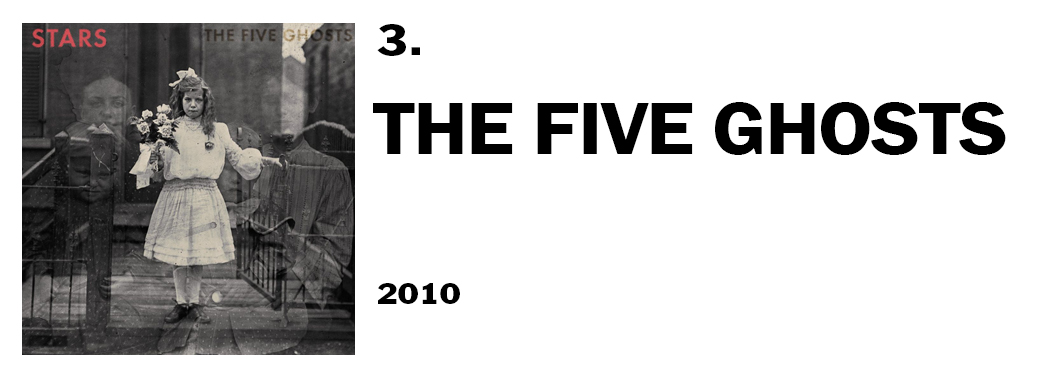
I believe at the time you said this was your favorite record.
Yes. Well, it happened right when my dad died. We were right in the middle of writing it when he died. And he had been incredibly close to not just me, but to the band. He had been a big supporter of ours. And it just ruined my life. At the same time my child was born with some very serious medical problems, which have since completely resolved, and she’s 100 percent healthy and awesome. But at the time it was just terrifying. So I was in the true, fucking blackness—the darkest time of my whole life. That record is the only time in my career where I’ve only written from myself and from what I was feeling and going through. And Tom McFall came back.
I just love the brevity of the record and how focused it is on one idea. I love how dark it is, because that was always my ultimate vision for Stars, that we would be a very dark band; a very pretty, dark, beautiful thing. I was always a big fan of the Beautiful South, who had pretty melodies in songs about burying people in walls. That appeals to my sense of humor. To me, The Five Ghosts is the bravest thing that we’ve made and the most unrelenting record. Lyrically, I can’t listen to the record, though. I can’t really do it. “Dead Hearts” is such a big song now that we have to play it, but it’s become separate from the rest of the record. For me, hearing that record is tough. But I think it’s a work of art. I felt very grateful and proud of my friends for going into that darkness with me, and just allowing what was happening to us to happen. And it’s short! Short is good.
For this album, you went independent and launched your imprint, Soft Revolution. How much more difficult did it make this album cycle?
Well, we had a licensing deal with Vagrant in the US, but we did put it out independently in Canada with a distro deal with Warner. The record tanked, so maybe that made it harder. You never know with records. At the end of the day, what I’ve learned after 20 years is that it really doesn’t matter what record label you’re on, it’s just luck of the draw of whether it gets picked up by the publicity and record machine that creates wealth. But I think it was hard. What mitigated it was that, for some reason, it was the most licensed record we’ve ever done. We licensed the shit out of that record and made a lot of money out of it. “Dead Hearts,” particularly, we licensed a ton. So it was okay financially. Survival wise we made it. But I think it was sad because we felt so sad about it. We put it out and the critical response was, “Meh! It’s kind of depressing and kind of tinny. It’s not what we want. We want Set Yourself On Fire!” But I stand by these songs. I was sad that people didn’t get it, but over the years it’s a record that I’ve heard a lot of people who like the band say is their favorite. That is a top two or three favorite Stars record for people. So I think time has been kind to it.
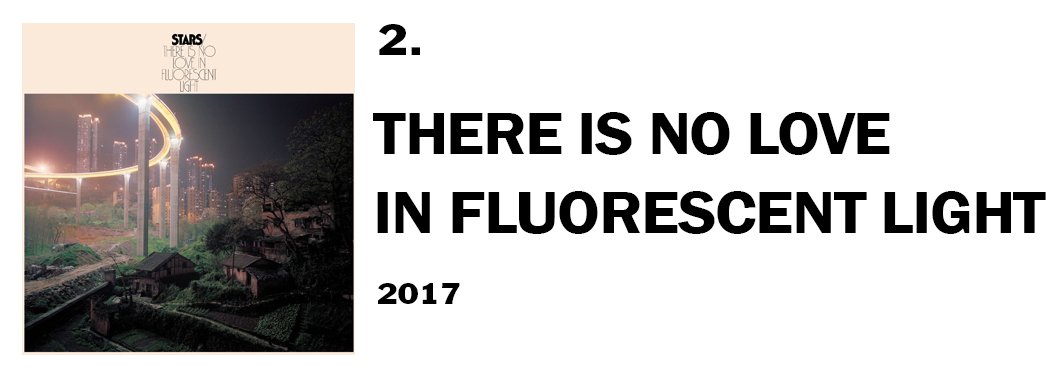
Well, I think it’s awesome. Sonically, it kicks the shit out of every record we’ve ever made—by many miles. It’s not even close. It sounds fucking beautiful and that’s because of Peter Katis, who we had wanted to work with on The North, and he once again did the last-minute pull-out because had to finish a National record or something. But he reached out to us when he heard we were going to make a new record. He wrote to Evan and said he felt bad we didn’t do that record together and that he was free. So then we went down to Connecticut and made the record in his studio. He is just amazing. He is fucking great. It’s like working with a hockey coach who is the most gifted musician you’ve ever met. For where we’re all at in our lives now with kids, it was just a beautiful clean and clear way to work.
This was also the first time that we had ever let someone truly produce us. We gave him 25 songs and let him choose which ones we would do. We had written all of these, state-of-the-world, “Donald Trump is awful,” #MeToo songs, and he said, “Yeah, those are good, but what you do best is blue, love songs. I like it better when you’re sad.” And I loved just having someone come in be like, “This is who you are. This is what you do really well.” It was a great reminder of what we are. I think there is a lot of discipline on that record, but also straight-up, beautiful, well-played music. It has a mood to it that we very much want to project. I think it’s the record that sounds most like a record we would put on at home.
What did you do with those political songs?
Nothing. Everything has to be perfect or it doesn’t exist to Evan and Chris. So I would happily go back and work on them but those guys just move forward. It’s too bad because some of them I felt were pretty cool. But I get it. I’m glad we didn’t do it because it’s very difficult to make a record about the times that doesn’t become a little redundant. And not to be on-the-nose and too topical. It’s really hard to make great political music. I think some of it was great, but some of it was okay. I’m a great believer in doing what you do. As Thelonious Monk said, “The genius is he who is most like himself.” And I think that is a beautiful definition of achievement in art. When you get closest to yourself is when you are best.
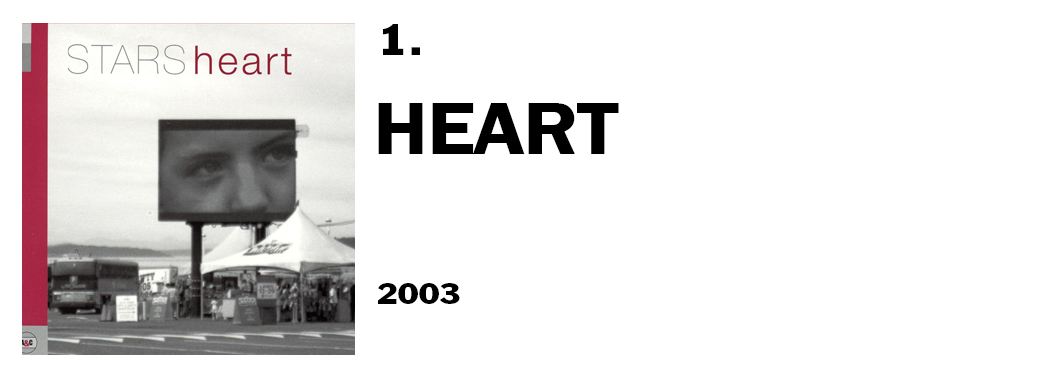
Why is this your favorite?
It does exactly what I wanted a band to do. It is exactly what it fucking says on the tin. “I am Torq, and this is my heart.” It’s named after a Pet Shop Boys song. It’s everything, aesthetically, I had been dreaming about all of my life. Amy is on it singing and writing beautifully. We are doing the true, back-and-forth duets. And Evan is showing us his musicality and showing us all of the options he brought us. To me, it’s the sound of us all being in love and believing in this idea completely, and enjoying. And it was made in a bedroom in Montreal.
Right. It is true bedroom pop.
True bedroom pop! We would actually wrap ourselves in the duvet for an isolation booth to do vocals. We called it the thong sausage. And it sounded great! It’s the right length. And it has both silly and strange songs on it. And if you listen to it you can hear my attempt to do every musical style that I’ve ever been obsessed with. Like blue-eyed soul, Steely Dan, shoegaze, synth-pop, New Order, the Smiths, it’s all in there. It wasn’t pastiche anymore, it was just us. It sounded like a band to me. You know, your first love is always the one you think most fondly of.
The liner notes read: “Long live the soft revolution!” Can you explain what that means for those who weren’t reading the music press in 2003?
[Laughs] Yeah, because if you were, you sure got a lot of it. My dad taught me that in art everything must always go wrong. Losing is the human condition. We lose together and we win alone. You should never, ever fight battles that you are not certain you are going to lose because if you are only fighting battles that you are certain you will win you’re a fucking fascist. Winning is for fascists, man! Winning is for Donald Trump. And losing is for the rest of us. Winning is an illusion and loss is real. The price of love is that you say goodbye. I just always believed in loss and that if people showed more weakness in the world we could beat the bastards. I went through high school being called a fag and getting beaten up and being ostracized for being an emotional person, and so bands are a way of starting your own gang, and proselytizing your own worldview. Everybody should have a revolution inside themselves and start a band with their friends. Even if it’s just a hobby, it’s a great thing to do. Start a band with your friends and accept that it’s not gonna work out the way you wanted it to, but it’s gonna be beautiful. Beauty is a powerful thing and there’s not enough stress put on that these days. We should spend more time with it and less time with fucking Instagram.
The band reissued the album in the spring. Did that change anything about the record for you?
It just reminded me of what a great record it was. I was so glad that it finally happened because it came out in those dead years when people weren’t even making vinyl anymore. So it never had a vinyl release. When I listened to it again I just really fucking loved this record. It sounds like happiness to me, like memories of being really happy and amazed that I was doing this with my buddies. The reason it’s my favorite is that it’s a testament to our friendship. And it’s when it began. If the band had broken up and we weren’t still together, maybe it wouldn’t be my favorite, but because we haven’t, it’s proof that we meant what we said and that we were worth it.
More
From VICE
-

(Photo by Jonathan Raa/NurPhoto via Getty Images) -

(Photo by zabelin / Getty Images) -

Collage by VICE

